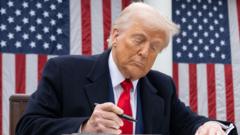In a significant shift, President Trump's administration has opted for a 90-day hiatus on higher tariffs amid mounting investor panic and public disapproval. While the White House frames the pause as part of a strategic negotiation tactic, critics argue it reflects political retreat in the face of resistance. The implications for U.S. trade relations, particularly with China, remain to be seen as the pause could just be a temporary reprieve from a contentious trade landscape.
Trump’s Tariff Reversal: Tactics or Retreat in Global Trade Strategy?

Trump’s Tariff Reversal: Tactics or Retreat in Global Trade Strategy?
The White House announces a 90-day pause on imposing new tariffs, sparking debate about the motivations behind the decision and its impact on U.S. trade relations.
In an unexpected move, President Donald Trump has decided to suspend the imposition of new tariffs, which had sparked fears of an all-out global trade war. For days, Trump and his administration had asserted their commitment to imposing steep "reciprocal" tariffs on numerous countries, even dismissing reports of a potential pause as mere speculation. However, the announcement of a 90-day hold on new tariff increases marks a notable development in U.S. trade policy, one that some say reflects underlying investor concerns and public pushback.
Following the announcement, Treasury Secretary Scott Bessent revealed that over 75 countries had reached out to the U.S., indicating that they would likely continue diplomatic negotiations during this period. Observers are left to wonder if this decision is truly a strategic pause or a tactical retreat from aggressive trade stances in response to negative economic indicators.
Trump's aides quickly took to the media to praise the administration's approach. Trade advisor Peter Navarro claimed the situation was progressing as planned, while press secretary Karoline Leavitt framed the announcement as a signal that other nations are eager to engage with the U.S. Nevertheless, key questions remained unanswered about which countries would be affected and how the details would impact existing agreements, with both allies and adversaries scrutinizing Trump's statement on his social media platform.
In acknowledging the economic fears that led to the tariff freeze, Trump hinted at underlying issues plaguing the U.S. economy, yet maintained that this decision was necessary for the greater good. Critics from the Democratic Party, such as Senate Minority Leader Chuck Schumer, painted a less favorable picture, suggesting that Trump's actions epitomized "governing by chaos."
As the world watches, the U.S. finds itself navigating a tricky landscape, one where it must manage relationships with both allies and adversaries while keeping an eye on the escalating trade tensions with China, marked by tariffs of up to 125%. The coming weeks will reveal how this tariff pause will affect both domestic markets and global trade relations, with uncertainty lingering beyond the 90-day window. Will Trump's actions facilitate smoother negotiations, or will they further complicate the already fraught economic landscape?





















